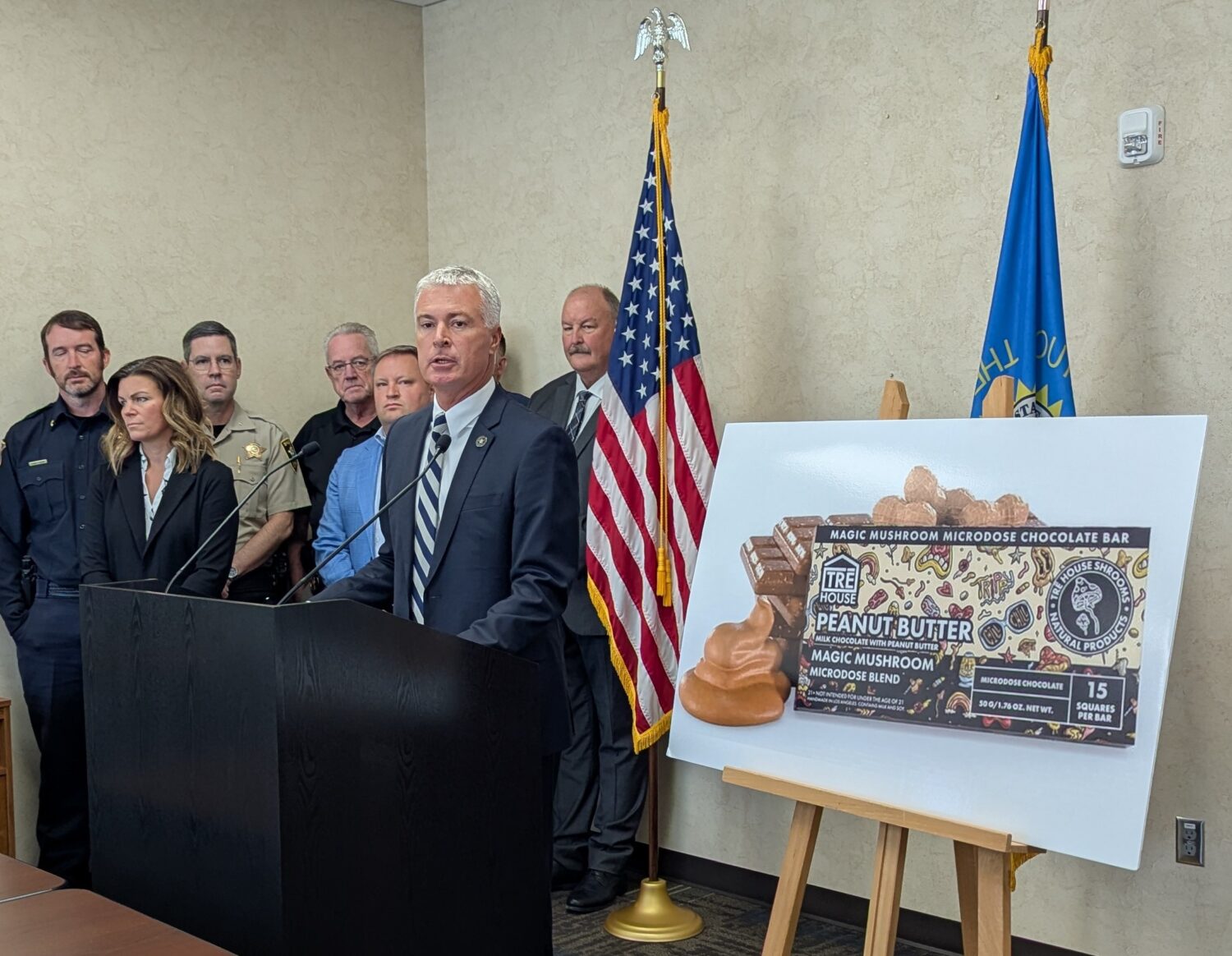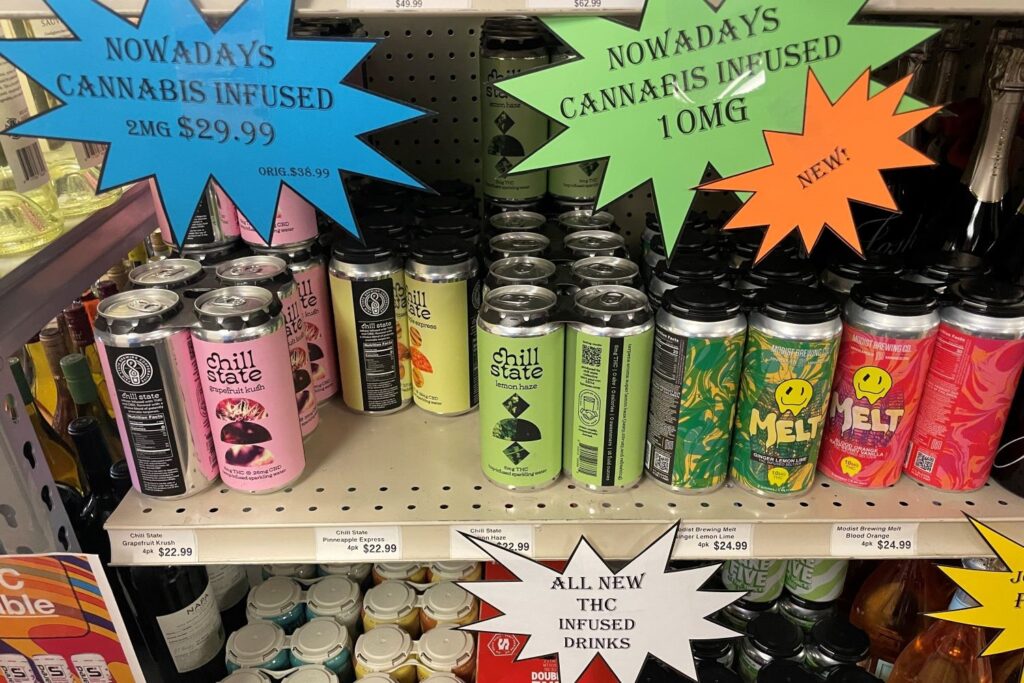Drinks advertised as THC- and cannabis-infused on the shelves of a Rapid City store in July 2024. (Seth Tupper/South Dakota Searchlight)
Beer distributor Byron Schafersman said the availability of buzz-inducing “THC” seltzers that South Dakotans are increasingly finding at bars and liquor stores across the state is jeopardized by a provision in congressional legislation to reopen the federal government.
“What I can tell you is consumers said loud and clear that they want this product,” said Schafersman, of Global Distributing, based in Renner. “And now it’s getting ripped away.”
The provision could wipe out a whole range of hemp-based products ranging from those seltzers to lotions used for arthritis pain, according to Katie Sieverding, who lobbies on behalf of both the hemp industry and beer wholesalers in South Dakota.
“My fear is that we’re going to sweep in products that we weren’t even thinking about,” she said.
The language in the U.S. Senate’s stopgap spending package — which was expected to gain approval from the House and President Trump on Wednesday night — caps the allowable high-inducing compound (known as THC) in any hemp-derived consumer product at 0.4 milligrams per container. That’s a fraction of what’s found in the 5- to 10-milligram beverages and gummies, for example, now sold in stores. It’s also less than what is found in many of the non-high-inducing “CBD” products, often sold as pain-relieving oils, lotions and balms, according to Josh Schneider, the policy adviser for the National Industrial Hemp Council.
Schneider said the U.S. hemp industry generates roughly $26 billion annually, with “well over $25 billion” tied to hemp-derived compounds like CBD and THC. Schneider said the new cap would dismantle those markets, eliminate hundreds of thousands of jobs, and strand years of investment in processing and extraction facilities.
Hemp in South Dakota
While Sieverding said most of the hemp grown in South Dakota is for grain and fiber, a small share of South Dakota hemp farmers do rely on CBD and hemp-derived THC products.
Production of hemp, which is low in THC, was federally authorized in the 2018 Farm Bill, which defined hemp as cannabis with no more than 0.3% THC by dry weight. The intent was to legalize non-intoxicating uses like hemp fiber for things like clothing and CBD for things like joint pain relief. But critics say it also created a loophole: manufacturers have found ways to convert legal hemp plants into potent forms of synthetic marijuana. Since then, hemp-derived products with intoxicating effects have taken off.
GET THE MORNING HEADLINES.
In South Dakota, hemp became legal to grow in 2021, and the state now harvests more hemp for fiber than any other.
Ken Meyer, a board member of the South Dakota Industrial Hemp Association and co-chair of the U.S. Hemp Roundtable’s Farmer Advisory Council, said most South Dakota hemp is grown for grain and fiber, not for use in intoxicating products. Regardless, he said the change would devastate small retailers that serve clients who don’t want to obtain a patient card for medical marijuana, which has been allowed in South Dakota since the state started its medical marijuana program in 2021.
“These are adults who don’t want to go to dispensaries,” Meyer said. “They just want something to help them relax or manage pain.”
‘Every AG is seeing it’
A Nov. 4 letter from 39 state attorneys general, including South Dakota Attorney General Marty Jackley, urged Congress to close the hemp-derived THC “loophole.”
“This is something that we in the attorney general community have been dealing with, especially with the sale of these products to minors,” Jackley said. “Every AG is seeing it.”
South Dakota legislators passed a law in 2024 that closed a portion of the loophole by banning chemically synthesized versions of THC, sold under names like Delta-8 and THC-O, sometimes called “diet weed.” Jackley’s office recently conducted a sting and found five smoke shops allegedly in violation of that law.

Jackley said South Dakota’s hemp industry should remain focused on agricultural and industrial uses, not the sale of “these dangerous chemicals marketed to minors.” He said people in need of those products can apply for a medical marijuana card.
News welcomed by medical marijuana industry
Ned Horsted runs 605 Cannabis, which grows medical marijuana and has a medical dispensary in the state. He called the federal legislation “encouraging,” given that his industry is tightly regulated and tested — which is costly — and he views it as unfair that comparable legal standards for hemp-derived intoxicating products were not being applied.
“We need a free and fair market,” he said.
Hemp growers, retailers targeted in section of government shutdown legislation
Horsted was involved with an unsuccessful past effort to legalize the recreational use of marijuana. He said if that effort had succeeded, today’s “loophole” would not have have transformed into the market it has in South Dakota.
“Our bill said you would have to be 21 to buy any of this, and there would be far more oversight and regulation than what is on the products that are currently alleviating consumers’ demand for THC,” he said.
Horsted noted that South Dakota’s Medical Marijuana Oversight Committee has heard numerous complaints during its last two meetings that “smoke shops” are selling illegal and intoxicating products, often getting into the hands of minors.
At its Nov. 4 meeting, members approved a motion urging the creation of an interim study committee to investigate the issue and another recommending that sales of THC products be limited to licensed medical marijuana dispensaries.
Smoke shops and CBD
Caleb Rose helps run what some people describe as a “smoke shop,” selling hemp-derived THC products ranging from CBD to gummies and vapes. He is part-owner of Black Hills Vapors and Black Hills CBD.
Rose said that because the proposed THC cap applies per container, it will mean many non-intoxicating CBD products he sells will no longer be available.
“We’re going to lose a lot of those topical products that are completely non-psychoactive,” he said.
He said there would still be legal CBD options, but they would be costly and may be less effective.
Rose estimated a 30% hit to his business and argued that the biggest losers are people using THC seltzers and gummies as “better alternatives” to things like drinking alcohol or pain-relieving pharmaceuticals.
Bad for beverage sales
Schafersman’s Global Distributing sells 5- to 10-milligram, hemp-derived THC seltzers. He emphasized that the products are low-dose, contrasting them with some higher-milligram vapes and edibles sold at “smoke shops.”
He also said beverages are a safer, more controllable way to consume THC than gummies or vapes, particularly due to the physical limits on overconsumption, noting, “a child can’t just go and chug 10 of these at a time.” The company has turned down offers to sell drinks with higher milligram levels.
“We’ve concluded smaller milligrams is a key to us making sure that people have a good experience and they’re not overconsuming,” Schafersman said.
He said the nation’s alcohol distribution model is already designed to keep products out of kids’ hands.
“I’m not selling this to anybody who doesn’t have a liquor license. Nobody who doesn’t have a beer license. I’m not selling it to the little pot shops,” he said.
Schafersman said that while demand for alcohol has decreased, especially among younger people, there is growing adult consumer demand for THC beverages. He said the federal legislation will force layoffs if it becomes law.
“It’s going to be a huge, huge negative for us at Global Distributing,” he said. “This is a multi-million dollar market in the state.”
YOU MAKE OUR WORK POSSIBLE.





